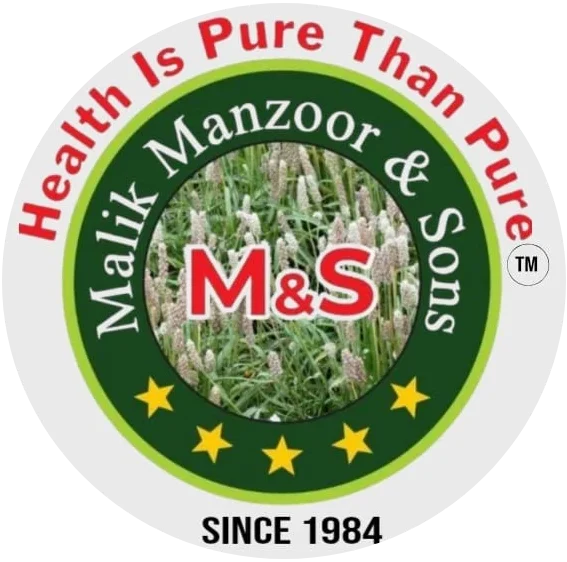Does Psyllium Husk Expire? Shelf Life, Storage Tips & Quality Guide – 2025
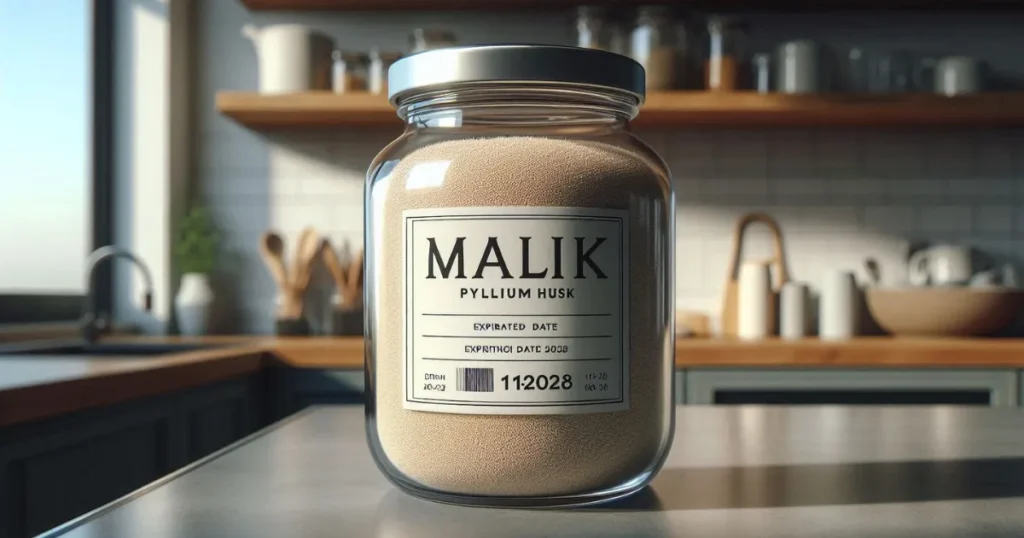
After decades of growing, processing, and supplying psyllium husk globally, I’ve answered this question thousands of times: does psyllium husk expire? The short answer is yes, but the real story is more nuanced. Understanding shelf life, proper storage, and quality indicators will help you get maximum value from this incredible fiber supplement. Let me share everything I’ve learned from my years working with premium Pakistani psyllium.
Understanding Psyllium Husk Shelf Life
Does psyllium husk expire? Absolutely. Like any natural product, psyllium husk has a finite shelf life. Most commercial psyllium husk products remain effective for 2 – 3 years from the manufacturing date when stored correctly. However, I’ve seen properly stored psyllium maintain quality beyond this timeframe.
The expiration date printed on the packaging isn’t arbitrary. It represents the manufacturer’s guarantee of optimal potency and effectiveness. After this date, the fiber content doesn’t vanish overnight, but quality gradually declines.
From my experience processing psyllium at our facilities, the expiration timeline depends on several factors: processing quality, packaging methods, storage conditions, and exposure to environmental elements. Pakistani psyllium, known globally for superior quality, typically maintains stability longer than lower-grade alternatives due to rigorous processing standards.
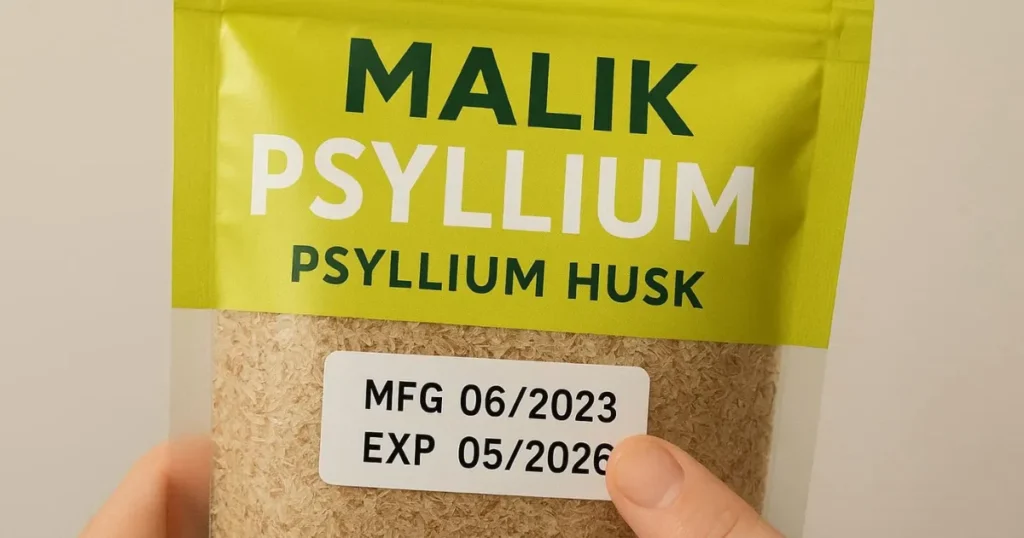
Does Psyllium Husk Expire: What Happens When Psyllium Husk Ages?
When psyllium husk approaches or passes its expiration date, several changes occur. The mucilage content – the soluble fiber responsible for psyllium’s health benefits – begins degrading. This doesn’t make the product harmful immediately, but it becomes less effective.
I’ve tested aged psyllium samples in our labs. The absorption capacity diminishes, meaning you’d need more product to achieve the same digestive benefits. The texture changes, too. Fresh psyllium has a specific consistency when mixed with water. Expired psyllium often clumps differently or doesn’t gel properly.
Color transformation is another indicator. High-quality psyllium husk starts with a light beige or cream color. As it ages, oxidation causes darker, brownish tones. This visual change signals declining freshness.
The taste and smell also evolve. Fresh psyllium has a mild, slightly earthy aroma. Expired or improperly stored psyllium develops a musty, stale odor. If you notice any rancid smell, discard it immediately.
Factors That Affect Psyllium Husk Longevity
Several environmental factors determine how long psyllium husk remains viable. Understanding these helps you maximize shelf life.
Moisture exposure
It is the primary enemy. Psyllium is hygroscopic, meaning it absorbs moisture from the air. When moisture penetrates the product, it creates an ideal environment for bacterial growth and mold. I’ve seen entire batches ruined by improper humidity control.
Temperature fluctuations
It accelerates degradation. Heat speeds up oxidation processes that break down beneficial compounds. Conversely, extreme cold can alter texture. Consistent, cool temperatures preserve quality longest.
Light exposure
Particularly, direct sunlight damages psyllium’s delicate fiber structure. UV rays trigger chemical reactions that reduce potency. This is why quality manufacturers, including Malik Psyllium, use opaque or UV-protective packaging.
Air exposure
Introduces oxygen, which oxidizes the product over time. Once you open a container, the clock speeds up. Resealing containers properly after each use is crucial.
Packaging quality
It makes an enormous difference. Premium psyllium comes in moisture-barrier bags or airtight containers. Cheaper products in flimsy packaging expire faster regardless of the printed date.
Optimal Storage Methods for Maximum Freshness
Let me share proven storage techniques I’ve developed over decades of handling psyllium.
Store psyllium husk in a cool, dry place away from direct sunlight. Your pantry works perfectly if it’s not near heat sources like ovens or dishwashers. Ideal temperature range is 15 – 25°C (59 – 77°F).
Keep the original packaging if it’s high-quality. If you’ve purchased bulk psyllium, transfer it to an airtight glass or food-grade plastic container. Glass jars with rubber-sealed lids offer excellent protection.
Never store psyllium near spices, coffee, or other aromatic products. Psyllium absorbs odors easily, affecting taste and potentially introducing contaminants.
Avoid bathroom storage despite the convenience factor. Bathrooms experience humidity spikes from showers and baths. This moisture exposure significantly shortens shelf life.
Consider refrigeration for extended storage, especially in humid climates. If you choose this method, ensure the container is completely airtight to prevent condensation. Let refrigerated psyllium reach room temperature before opening to avoid moisture buildup.
For bulk buyers, portion your supply. Keep a small amount accessible for daily use and store the remainder sealed. This minimizes air exposure to your main supply.
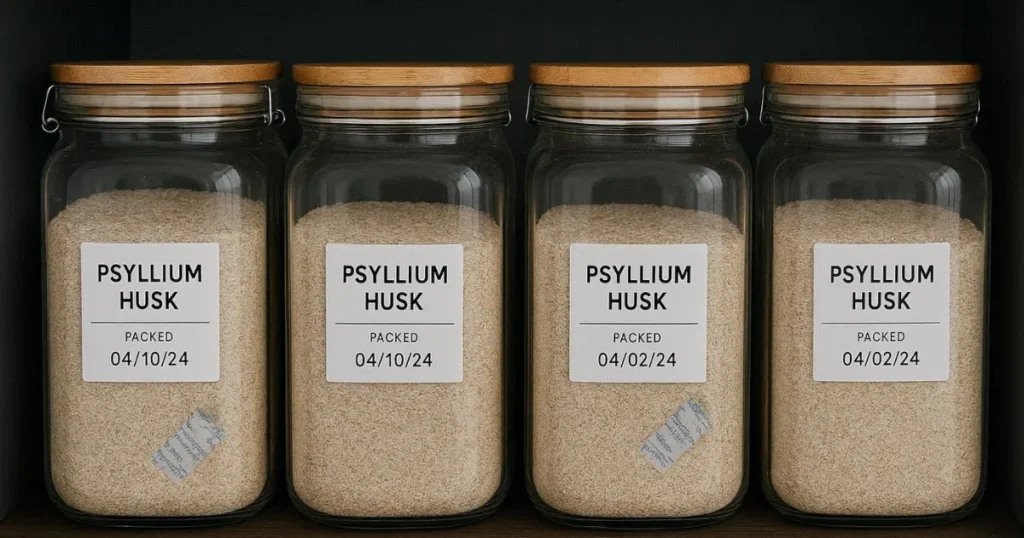
Recognizing Signs of Expired Psyllium Husk
Knowing when does psyllium husk expire; protects your health and ensures you’re getting beneficial fiber. Here are the definitive indicators I use:
Visual inspection reveals a lot. Fresh psyllium maintains consistent color – typically light tan or beige for husk. Dark spots, discoloration, or any visible mold means immediate disposal. Any clumping within the package suggests moisture infiltration.
The smell test is equally important. Take a whiff before using. Fresh psyllium has a neutral, slightly grassy scent. Any sour, musty, rancid, or unusual odors indicate spoilage. Trust your nose – it’s rarely wrong.
Texture changes signal quality loss. Pour some into your palm. It should feel fine and powdery (for powder) or have distinct flakes (for husk). If it feels sticky, clumps together without liquid, or has a different consistency, it’s likely compromised.
Mixing behavior provides functional feedback. When you add water to fresh psyllium, it absorbs liquid and forms a gel within seconds. Expired psyllium doesn’t hydrate properly. If it remains grainy, doesn’t swell, or creates an unusual consistency, it’s past prime.
Taste difference becomes apparent if you regularly consume psyllium. While never delicious, fresh psyllium tastes neutral to mildly earthy. Bitter, sour, or off-flavors indicate deterioration.
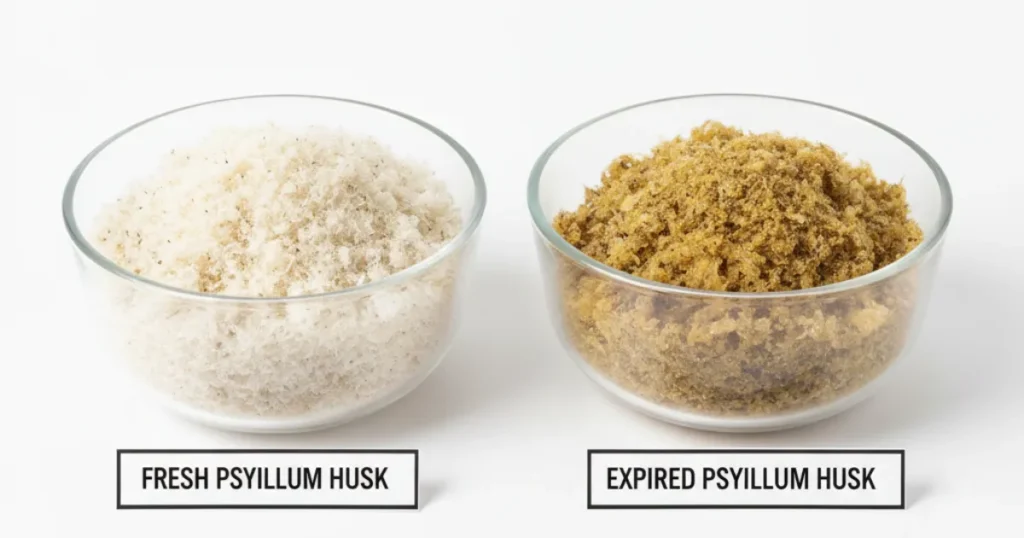
Does Expired Psyllium Husk Become Harmful?
This question worries many consumers. Does psyllium husk expire into something dangerous? Generally, expired psyllium isn’t toxic, but I don’t recommend consuming it.
The primary risk isn’t poisoning – it’s ineffectiveness. You’re taking psyllium for digestive health, regularity, cholesterol management, or blood sugar support. Expired product delivers minimal benefits, making it a waste of effort and money.
However, improperly stored psyllium can develop mold or bacterial contamination. These microorganisms produce toxins that cause digestive upset, allergic reactions, or worse. I’ve consulted on cases where moldy psyllium caused severe gastrointestinal distress.
If you have compromised immunity, pregnancy, or existing health conditions, never risk expired supplements. The potential consequences outweigh any perceived savings from using the old product.
Comparing Pakistani vs. Other Psyllium Quality
Having worked with psyllium from various origins, I can confidently state that Pakistan produces the world’s highest-quality psyllium husk and powder. The arid climate, soil composition, and traditional cultivation methods in regions like Sindh and Punjab create ideal conditions.
Pakistani psyllium typically offers superior shelf stability. The low initial moisture content and careful processing mean it resists degradation longer than alternatives. India also produces significant quantities, but in my professional assessment, Pakistani psyllium maintains better consistency and purity.
When you purchase premium Pakistani psyllium, you’re investing in a product with inherent longevity. The rigorous quality controls at facilities like ours ensure you receive psyllium that not only lasts longer but delivers better results throughout its shelf life.
Extending Shelf Life: Professional Tips
Here are advanced techniques I use for preserving psyllium quality:
Vacuum sealing removes oxygen, significantly extending shelf life. If you buy bulk psyllium, consider investing in a vacuum sealer. Portion into smaller bags for long-term storage.
Oxygen absorber packets work wonders. These small packets remove oxygen from sealed containers. Food-grade oxygen absorbers are inexpensive and dramatically slow oxidation.
Desiccant packets combat moisture. If you live in humid environments, add food-safe silica gel packets to your psyllium containers. Replace them every few months.
Freezing is viable for very long-term storage. Portion psyllium into airtight containers or vacuum-sealed bags. Frozen psyllium can last 3 – 5 years. Thaw portions as needed, allowing them to reach room temperature before opening to prevent condensation.
Buy appropriate quantities. While bulk buying seems economical, it’s wasteful if the product expires before use. Calculate your consumption rate and purchase accordingly. Most individuals use 10 – 30 grams daily, meaning a 500-gram package lasts roughly 17 – 50 days.
Psyllium Husk vs. Psyllium Powder: Shelf Life Differences
Does psyllium husk expire differently than psyllium powder? Yes, there are subtle differences.
Psyllium husk, being less processed, generally maintains its quality longer. The intact fiber structure resists degradation better than ground powder. However, husk is more susceptible to moisture absorption due to its larger surface area.
Psyllium powder, being finely ground, oxidizes faster once exposed to air. The increased surface area accelerates chemical reactions. However, powder often comes in better packaging, which can offset this vulnerability.
In my experience, properly stored husk lasts 2 – 3 years, while powder remains optimal for 18 – 24 months. Both require identical storage conditions – cool, dry, dark, and sealed.
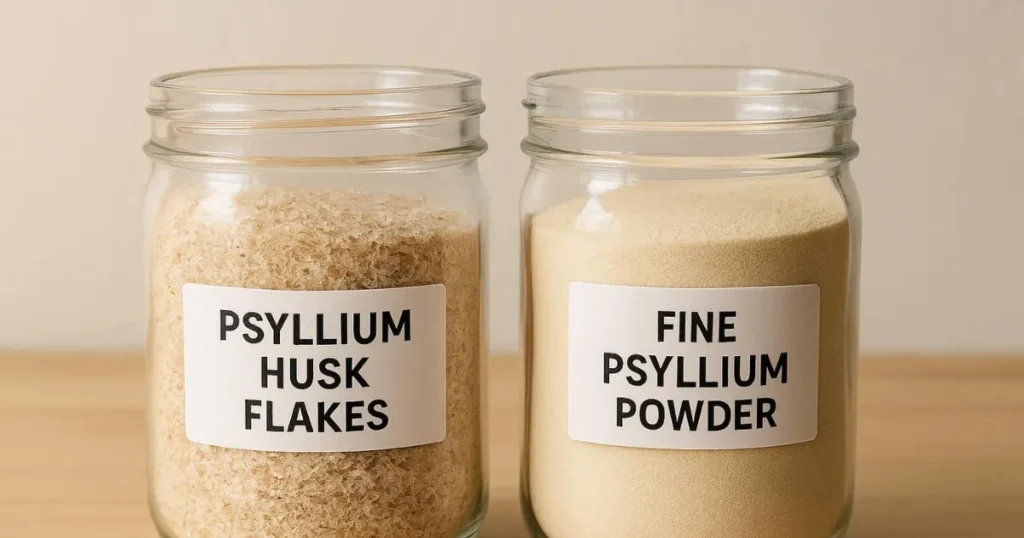
Understanding Expiration Date Labels
Manufacturers use different labeling systems. Understanding these helps you make informed decisions.
“Best By” dates indicate peak quality, not safety deadlines. Psyllium remains usable several months beyond this date if stored properly and shows no spoilage signs.
“Expiration” or “Expires On” dates represent the manufacturer’s quality guarantee end point. After this date, effectiveness isn’t guaranteed, though the product isn’t necessarily harmful.
“Manufacturing Date” helps you calculate freshness. If a package shows a manufacturing date but no expiration, assume a 2-year shelf life from that point.
Always prioritize products with clear, recent dates. When I select psyllium for our customers, I ensure the freshest possible inventory, maximizing the usable period.
Health Benefits and Their Relation to Freshness
The reason we care whether does psyllium husk expires relates directly to health benefits. Fresh psyllium delivers maximum fiber content, supporting digestive regularity, cholesterol reduction, blood sugar management, and satiety.
As psyllium ages, the mucilage content – the soluble fiber creating the gel-like consistency – deteriorates. This means expired psyllium provides less digestive support. If you’re taking psyllium for specific health outcomes, using fresh product ensures you receive full therapeutic value.
I’ve worked with nutritionists and dietitians who emphasize that fiber quality matters. Taking degraded psyllium and expecting results is like using expired vitamins – you might get some benefit, but you’re not experiencing the full potential.
Common Myths: Does Psyllium Husk Expire?
Let me address misconceptions I frequently encounter:
Myth: Psyllium never expires because it’s natural.
False. Natural doesn’t mean imperishable. Psyllium is an organic material subject to degradation like any plant-based product.
Myth: You can tell just by looking.
Partially true. Visual inspection helps, but internal quality loss occurs before visible changes. You might not see spoilage, but potency has declined.
Myth: Expired psyllium is just less effective, never harmful.
Mostly true, but moldy or contaminated psyllium can cause health issues. Always inspect carefully.
Myth: Refrigeration isn’t necessary for psyllium.
True for normal shelf life, but refrigeration extends longevity, especially in hot, humid climates.
Myth: The expiration date is just a sales tactic.
False. Responsible manufacturers base dates on stability testing. They represent genuine quality thresholds.
Economic Considerations: Fresh vs. Expired
Some consumers wonder if using psyllium slightly past expiration saves money. From both economic and health perspectives, I advise against it.
Fresh psyllium delivers full benefits, meaning you need less product to achieve desired effects. Expired psyllium requires larger doses for reduced benefits. You’re actually spending more for less.
Additionally, taking ineffective psyllium might delay addressing digestive issues, potentially leading to more expensive interventions later. The small savings from using old product aren’t worth the health risks or diminished results.
Invest in quality, fresh psyllium from reputable suppliers. The difference in cost is negligible compared to the difference in outcomes.
Bulk Buying: Balancing Economy and Freshness
Many customers ask about bulk purchases. Does psyllium husk expire before you can use large quantities?
Bulk buying makes sense if you consume psyllium regularly and can store it properly. A family using psyllium daily can easily consume 1 – 2 kilograms monthly, making bulk purchases economical and practical.
For individual users consuming 10 – 15 grams daily, a 1-kilogram package lasts approximately 2 – 3 months – well within the optimal freshness window.
Calculate your usage rate before buying in bulk. If you’re new to psyllium, start with smaller packages. Once you’ve established a routine, bulk buying becomes sensible.
When receiving bulk orders, immediately portion into smaller airtight containers. This protects the majority of your supply from repeated air exposure.
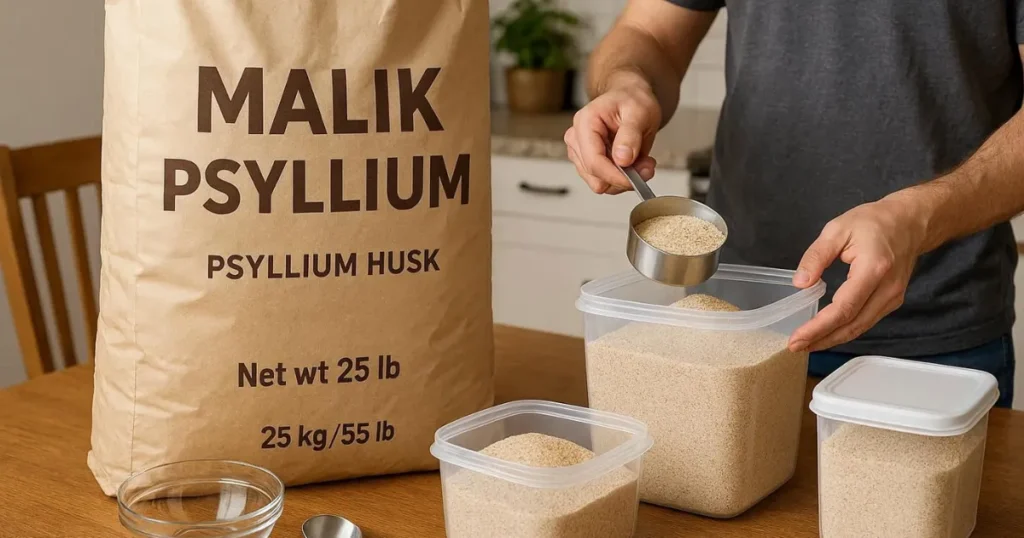
Global Standards and Regulatory Perspectives
Does psyllium husk expire? Different countries regulate supplement expiration dates differently. In the United States, the FDA requires expiration dates on dietary supplements. European regulations similarly mandate dating for consumer protection.
Pakistan, as the leading psyllium producer, has established rigorous standards ensuring export-quality psyllium meets international requirements. Facilities undergo regular inspections, and products receive certification confirming purity and safety.
When purchasing psyllium, look for certifications: organic certification, GMP (Good Manufacturing Practices) compliance, and ISO standards. These indicate adherence to quality protocols that include proper dating and storage guidelines.
My Professional Recommendation
After decades in this industry, here’s my straightforward advice: always check expiration dates before purchasing. Choose products with at least 18 – 24 months remaining shelf life. Store properly in cool, dry conditions. Inspect regularly for signs of degradation.
Does psyllium husk expire? Yes, but with proper selection and storage, you’ll enjoy fresh, effective psyllium throughout its optimal period. Don’t compromise on quality – your digestive health deserves the best.
Pakistan produces exceptional psyllium that, when handled correctly, delivers consistent benefits. Whether you’re using it for regularity, cholesterol management, or overall wellness, fresh psyllium makes all the difference.
Treat psyllium as you would any valuable health supplement. Respect its shelf life, store it carefully, and you’ll experience the full range of benefits this remarkable fiber offers.
How long does psyllium husk last after opening?
Opened psyllium husk lasts 6 – 12 months if stored in an airtight container in a cool, dry place away from moisture and sunlight.
Can I use psyllium husk past the expiration date?
If stored properly and showing no signs of spoilage (odor, discoloration, mold), it’s likely safe but less effective within 3 – 6 months past expiration.
How do I know if my psyllium husk has gone bad?
Check for musty odors, discoloration, clumping, mold, or failure to gel properly when mixed with water. Any of these indicate spoilage.
Does refrigerating psyllium husk extend its shelf life?
Yes, refrigeration can extend shelf life by 6 – 12 months, but ensure the container is completely airtight to prevent moisture absorption.
What’s the difference in shelf life between psyllium husk and powder?
Psyllium husk typically lasts 2 – 3 years, while powder lasts 18 – 24 months due to increased surface area exposure to air and oxidation.
Can expired psyllium husk make you sick?
Expired psyllium is generally not toxic, but moldy or contaminated psyllium can cause digestive issues. Always inspect before use.
Why does my psyllium husk clump together?
Clumping indicates moisture exposure. This compromises quality and may promote bacterial or mold growth. Store in airtight containers with desiccants.
Is Pakistani psyllium more stable than other origins?
Yes, Pakistani psyllium typically has lower initial moisture content and superior processing, resulting in better shelf stability and longer-lasting quality.
Does Psyllium Husk Expire?
Absolutely. Like any natural product, psyllium husk has a finite shelf life. Most commercial psyllium husk products remain effective for 3 – 5 years from the manufacturing date when stored correctly.
Conclusion
Does psyllium husk expire? Yes, and understanding this fact helps you maximize both value and health benefits. Throughout my decades working with premium Pakistani psyllium, I’ve learned that proper storage and timely use make all the difference between effective fiber supplementation and wasted product.
Remember the key takeaways: store psyllium in cool, dry conditions away from light and moisture. Always check expiration dates before purchasing, aiming for products with at least 18 months remaining shelf life. Inspect regularly for signs of spoilage – unusual odors, discoloration, or texture changes signal it’s time to replace your supply.
Fresh psyllium delivers maximum digestive support, cholesterol management, and overall wellness benefits. Using expired product isn’t just ineffective – it’s counterproductive to your health goals. Invest in quality psyllium from reputable sources, store it correctly, and consume it within the optimal timeframe.
Your gut health deserves fresh, potent fiber. By respecting shelf life and following proper storage practices, you’ll experience everything this remarkable natural supplement offers. Quality always wins over quantity when it comes to psyllium. Have you understand; Does psyllium husk expire?
Malik Shabbir
Featured Blogs
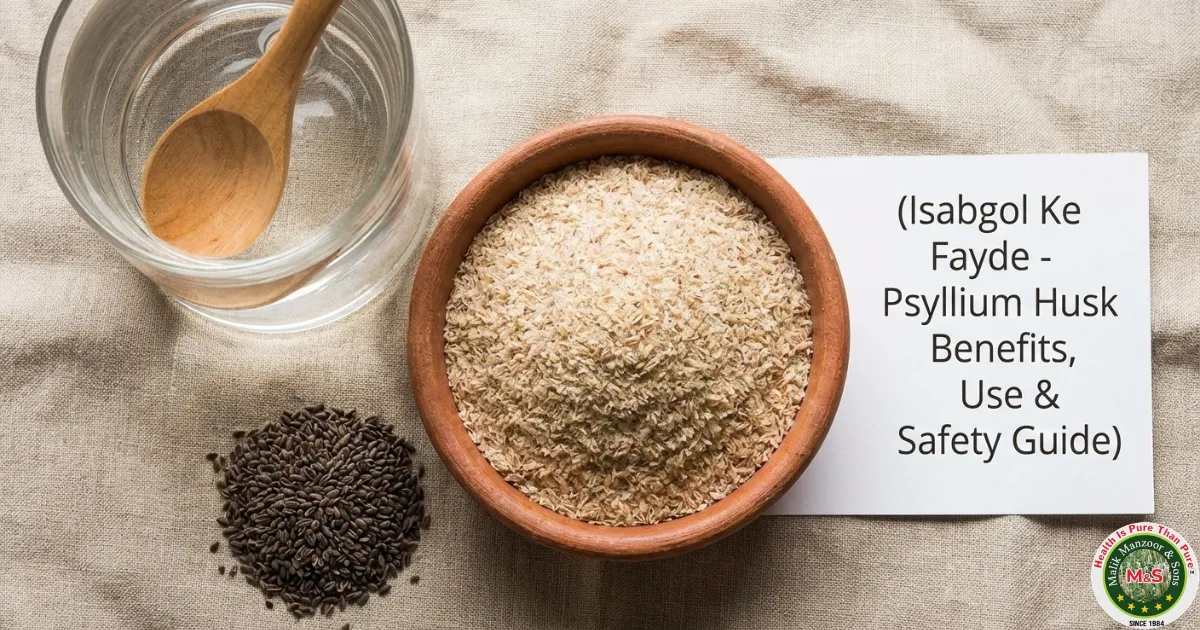
Isabgol Ke Fayde – Psyllium Husk Ke Poori Science-Based Rahnumayi – 2026
Isabgol ke fayde jaanna aaj ke daur mein zyada zaroori
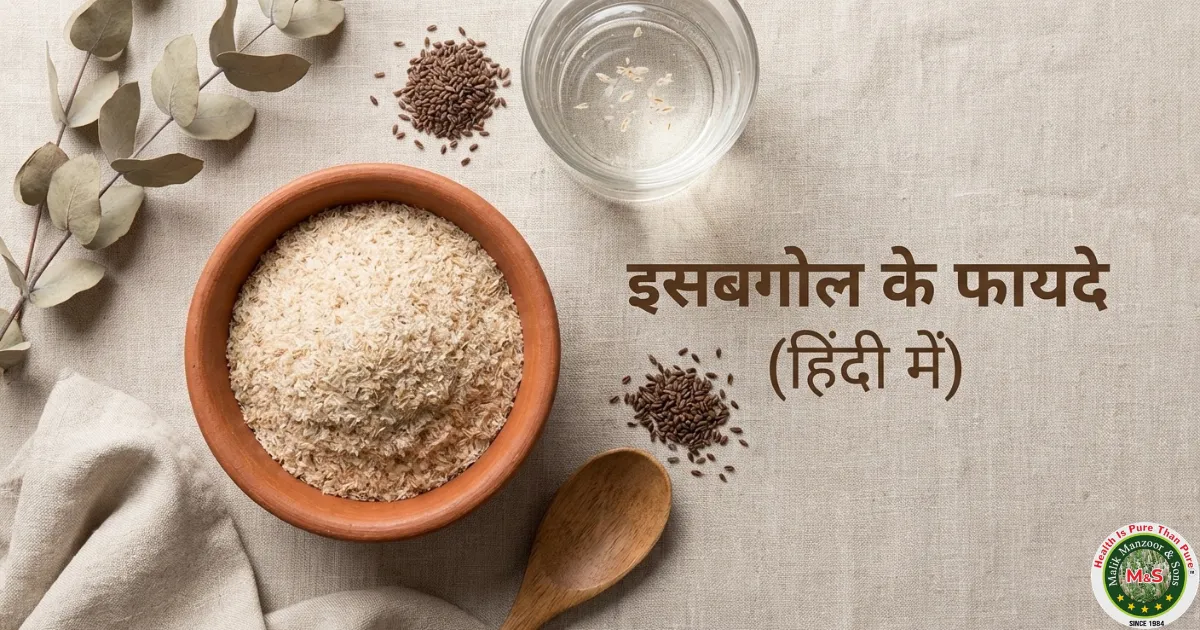
Isabgol Benefits in Hindi | Psyllium Husk Ke Fayde, Sahi Upyog Aur Savdhaniyan – 2026
Agar aap isabgol benefits in hindi mein samajhna chahte hain,
